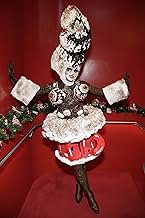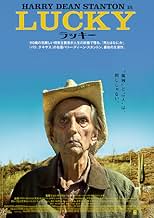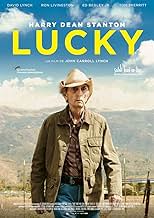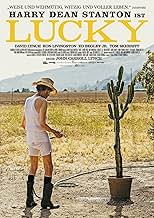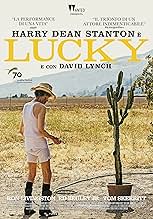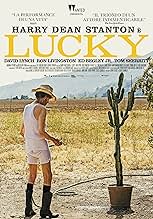PUNTUACIÓN EN IMDb
7,3/10
28 mil
TU PUNTUACIÓN
El viaje espiritual de un ateo de noventa años.El viaje espiritual de un ateo de noventa años.El viaje espiritual de un ateo de noventa años.
- Dirección
- Guión
- Reparto principal
- Premios
- 17 premios y 19 nominaciones en total
Pam Sparks
- Pam
- (as Pamela Sparks)
Ulysses Olmedo
- Juan Wayne
- (as Ulysses Olemdo)
Reseñas destacadas
2017 saw the passing of both Harry Dean Stanton and Sam Shepard, two-thirds of the creative triumvirate behind the classic 1984 road movie / western PARIS, TEXAS. Wim Wenders and Shephard contrived to give Stanton - a career character actor - one of the greatest roles in twentieth century cinema and he owned every guilt-ridden moment of that film. John Carroll Lynch, in many ways a modern day Stanton, uses his directorial debut to showcase the ninety-year-old Stanton's formidable cussedness and aching vulnerability in a way that is as perfect a bookend to an acting career as GRAN TORINO was to Clint Eastwood.
LUCKY is a deceptively simple tale of a determinedly alone old naval officer, who has got to the stage in life where even his doctor (a fabulous cameo from Ed Begley Jr.) has nothing to tell him when he takes a dizzy tumble. This is an old man, going about things the only way he knows how. His days are a series of little routines sparingly conveyed through repetition and variation in the first half of the film. He knows he is going to die, he knows this scares him, but he also knows there is little else he can do other than persist, like the best of Samuel Beckett's characters.
There is something a little reminiscent of another Wenders' film in LUCKY, namely LIGHTNING OVER WATER. In that part-documentary, Wenders' sought to approach his own fear of death through the imminent mortality of veteran Hollywood filmmaker and close friend Nicholas Ray. Carroll Lynch is similarly engaging with the genuine fears of vulnerabilities of the ageing Stanton, as a means of tapping in to a wider understanding of what death is and what it means.
The film vacillates between profound human empathy and a less appealing, although far less prominent, sentimentality. It is often at its strongest in the barroom scenes in which Lucky goes through the motions of his compromised masculinity and desperately rails against and longs for the reckoning that remains a few miles further down the road. Carroll Lynch keeps the overall tone light and as sunny as the Californian landscape that his film cleaves to, which only makes moments like when Stanton lets rip with a Mariachi band all the more poignant, urgent and arresting. With some great supporting turns from the likes of David Lynch, Tom Skerritt and Ron Livingston, this perfectly formed, smallscale movie, has much bigger concerns at its heart.
LUCKY is a deceptively simple tale of a determinedly alone old naval officer, who has got to the stage in life where even his doctor (a fabulous cameo from Ed Begley Jr.) has nothing to tell him when he takes a dizzy tumble. This is an old man, going about things the only way he knows how. His days are a series of little routines sparingly conveyed through repetition and variation in the first half of the film. He knows he is going to die, he knows this scares him, but he also knows there is little else he can do other than persist, like the best of Samuel Beckett's characters.
There is something a little reminiscent of another Wenders' film in LUCKY, namely LIGHTNING OVER WATER. In that part-documentary, Wenders' sought to approach his own fear of death through the imminent mortality of veteran Hollywood filmmaker and close friend Nicholas Ray. Carroll Lynch is similarly engaging with the genuine fears of vulnerabilities of the ageing Stanton, as a means of tapping in to a wider understanding of what death is and what it means.
The film vacillates between profound human empathy and a less appealing, although far less prominent, sentimentality. It is often at its strongest in the barroom scenes in which Lucky goes through the motions of his compromised masculinity and desperately rails against and longs for the reckoning that remains a few miles further down the road. Carroll Lynch keeps the overall tone light and as sunny as the Californian landscape that his film cleaves to, which only makes moments like when Stanton lets rip with a Mariachi band all the more poignant, urgent and arresting. With some great supporting turns from the likes of David Lynch, Tom Skerritt and Ron Livingston, this perfectly formed, smallscale movie, has much bigger concerns at its heart.
Lucky is both eerie and alluring in that it hasn't just turned out to be Harry Dean Stanton's swan song, it's as if all of those involved in the making of it were watching the Grim Reaper approach Mr. Stanton from a distance during filming.They were certainly aware - and impressed - that he was 90 years old. There's not a bad performance in the whole film; everyone gives a thoughtful, elegant performance as if there is no room for childishness in the presence of the approaching death of their friend. Surely Mr. Stanton could feel to the core that his days were numbered, and wow did that make for an eloquent performance in a role perfectly suited for him. Despite Lucky being a film about the waning of life, it's not a morose film; the message seems to be that while death is scary, you can still smile at it, and still smile till the end. And while you lose some liveliness as you grow old, that doesn't mean that you have to lose your feistiness. As much as I enjoyed Lucky, I also believe that a good filmmaker could have followed almost any old man for a few weeks with a video camera and come up with an equally interesting film. Lucky is essentially one down-to-earth old man's tale of a rather unexciting present-day life, and that's about it...but maybe that's special in itself. Still, I didn't see a whole lot that was fantastic about it beyond Mr. Stanton's performance. But there's no denying that it's a well-made film, with poignant and sometimes amusing moments, moving stories from the distant past, and many good shots of the desolate, solitary desert.
Just recently saw an independent film called "Lucky" with the now late character actor Harry Dean Stanton and clearly it was a touching swan song for Harry and for those who viewed it. Stanton is Lucky a living 90 year old man who's probably at the end of the tunnel despite okay health. And you guessed it he's set in his ways especially with the belief that he doesn't want to face death or he's not too set on the believe of a higher power.
Living in the southwest Lucky's days are spent walking, and going to the local bar and diner to drink and he passes his time during the day after getting up working puzzles and watching game shows. Plus he even smokes some weed with a new African American female friend. And the chats and visits with locals and friends help Lucky move along.
Still thru it all this old man is set in his ways he who doesn't want new acceptance or change in which he fears in his small town life it's a long last reflection on life and being who he is. The supporting cast is well rounded here with David Lynch, Ed Begley Jr., Tom Skeritt and others. Overall well done film of one looking at their life and surroundings and coming to terms with time and reflection without change.
Living in the southwest Lucky's days are spent walking, and going to the local bar and diner to drink and he passes his time during the day after getting up working puzzles and watching game shows. Plus he even smokes some weed with a new African American female friend. And the chats and visits with locals and friends help Lucky move along.
Still thru it all this old man is set in his ways he who doesn't want new acceptance or change in which he fears in his small town life it's a long last reflection on life and being who he is. The supporting cast is well rounded here with David Lynch, Ed Begley Jr., Tom Skeritt and others. Overall well done film of one looking at their life and surroundings and coming to terms with time and reflection without change.
In terms of humanity, Lucky is the simplest story I've ever connected to. Seeing it in theaters was one of the most emotional experiences I've ever had watching a movie.
Lucky walks the thin line between being an exploration of death and a celebration of life, because it manages to be both. Lucky is a character that at first couldn't care less about his mortality. He didn't think about it because he didn't have to. But when the effects of old age start to set in, Lucky can't help but see his own death everywhere. With the onset of this fear, he learns to embrace death - "realism", as said in the movie. However, this process was not so easy, as he first had to let go of his anger to understand the beauty and sadness in the experience of his whole life up until his old age, and everything he has yet to be a part of.
Many try to claim that movies "used to be simpler" and "had better stories" due to less technology, but I'll be damned if they aren't easier to connect to now than ever. Lucky follows suit of movies, loosely like "Manchester by the Sea", and greatly like "Paterson" which both came out within the past year. These movies pay homage to real life by stripping the substance down to normal human experiences that most end up having to face, and everyone can at least recognize. In particular, Lucky is that of accepting how everything in life will go away in time, so all that can be done is to experience it. This ephemeral experience of life is both beautiful and sad, as this movie is both about life and death.
The reason that a movie like Lucky hit me so hard was because it threw nothing in my face. I was so immersed in what felt like real life to me that it was as sudden as extreme as life can be when all the sudden it got so emotional, like in the bar. Lucky's stance in the bar, letting go and explaining his stance as a human being was one of the most emotionally moved I've ever been by a single scene. Again, this is because everything develops so naturally, and because I personally connect with what Stanton's character has to find his way back to after 90 some years of age - being able to smile. While all aspects of the filmmaking delivered this effect, I especially recognize the script and Stanton's performance for their organic emotional accomplishment within the story.
To me, Lucky owns up to the internal and external unknown. It represents the ongoing process of learning how to smile in a life that will continue to break you down.
Lucky walks the thin line between being an exploration of death and a celebration of life, because it manages to be both. Lucky is a character that at first couldn't care less about his mortality. He didn't think about it because he didn't have to. But when the effects of old age start to set in, Lucky can't help but see his own death everywhere. With the onset of this fear, he learns to embrace death - "realism", as said in the movie. However, this process was not so easy, as he first had to let go of his anger to understand the beauty and sadness in the experience of his whole life up until his old age, and everything he has yet to be a part of.
Many try to claim that movies "used to be simpler" and "had better stories" due to less technology, but I'll be damned if they aren't easier to connect to now than ever. Lucky follows suit of movies, loosely like "Manchester by the Sea", and greatly like "Paterson" which both came out within the past year. These movies pay homage to real life by stripping the substance down to normal human experiences that most end up having to face, and everyone can at least recognize. In particular, Lucky is that of accepting how everything in life will go away in time, so all that can be done is to experience it. This ephemeral experience of life is both beautiful and sad, as this movie is both about life and death.
The reason that a movie like Lucky hit me so hard was because it threw nothing in my face. I was so immersed in what felt like real life to me that it was as sudden as extreme as life can be when all the sudden it got so emotional, like in the bar. Lucky's stance in the bar, letting go and explaining his stance as a human being was one of the most emotionally moved I've ever been by a single scene. Again, this is because everything develops so naturally, and because I personally connect with what Stanton's character has to find his way back to after 90 some years of age - being able to smile. While all aspects of the filmmaking delivered this effect, I especially recognize the script and Stanton's performance for their organic emotional accomplishment within the story.
To me, Lucky owns up to the internal and external unknown. It represents the ongoing process of learning how to smile in a life that will continue to break you down.
When born actors live long enough to perfect their talent, and they share the insight that their characters experience in life, you get a masterpiece. But, like the Mona Lisa, viewers perceive nuance as THEY age; even though the painting ITSELF remains unchanged.
What cannot be seen with young eyes waits for older eyes to catch up. The younger viewer perceives the ironic as insight. The emotion they experience evolves from the pathetique. In contrast the emotion I felt was that of fulfillment and apprehension regarding the next chapter of existence.
When it was first unveiled, I doubt that people came from the world over to stare at Mona Lisa as they do today. Harry could not have spun a better yarn, nor crafted a better legacy for future generations. How lucky some of us have been to see his career flower - what a thrill to watch its last petal set free.
Watch this movie every 10 years.
What cannot be seen with young eyes waits for older eyes to catch up. The younger viewer perceives the ironic as insight. The emotion they experience evolves from the pathetique. In contrast the emotion I felt was that of fulfillment and apprehension regarding the next chapter of existence.
When it was first unveiled, I doubt that people came from the world over to stare at Mona Lisa as they do today. Harry could not have spun a better yarn, nor crafted a better legacy for future generations. How lucky some of us have been to see his career flower - what a thrill to watch its last petal set free.
Watch this movie every 10 years.
¿Sabías que...?
- CuriosidadesShot in eighteen days.
- PifiasWhen he goes to the convenience store to buy 1/2 gallon of milk he gives the clerk a 10 dollar bill and she gives him 25 cents change.
- ConexionesFeatured in Fandor: Why Harry Dean Stanton Is The G.O.A.T. Character Actor (2017)
- Banda sonoraCon El Tiempo Y Un Ganchito
Written by Genaro Nunez
Performed by Pedro Infante
Published by Peer International Corporation on behalf of itself and Promotora Hispano Americana De Musica
Courtesy of Pham Records
Selecciones populares
Inicia sesión para calificar y añadir a tu lista para recibir recomendaciones personalizadas
- How long is Lucky?Con tecnología de Alexa
Detalles
- Fecha de lanzamiento
- País de origen
- Sitios oficiales
- Idiomas
- Títulos en diferentes países
- Lucky: Un joven de noventa años
- Localizaciones del rodaje
- Cave Creek, Arizona, Estados Unidos(surrounding desert)
- Empresas productoras
- Ver más compañías en los créditos en IMDbPro
Taquilla
- Recaudación en Estados Unidos y Canadá
- 955.925 US$
- Fin de semana de estreno en EE. UU. y Canadá
- 43.293 US$
- 1 oct 2017
- Recaudación en todo el mundo
- 2.728.446 US$
- Duración1 hora 28 minutos
- Color
- Relación de aspecto
- 2.39 : 1
Contribuir a esta página
Sugerir un cambio o añadir el contenido que falta




